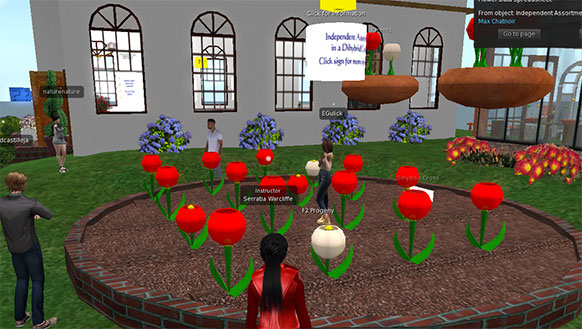
This image shows the Genome Island avatars of participants in UW’s recent Learning Actively Mentoring Program and the Office of Online and Digital Learning e-Camp. From left are Ryan Goeken, Juhyeon Ahn and Nora Gulick; at center with back facing camera is Rachel Watson, whose avatar name is Serratia Warcliffe. The avatar in the white shirt is a Genome Island guide. (UW Photo)
The University of Wyoming Science Initiative’s Learning Actively Mentoring Program (LAMP) and the Office of Online and Digital Learning (ODL) joined forces to deliver a dynamic weeklong summer institute focused on revolutionizing online teaching.
Held from June 23-27, the inaugural LAMP/ODL e-Camp invited 12 educators from UW, Wyoming’s community colleges and a high school to step into the student seat -- immersing themselves in hands-on, active learning designed for the digital classroom.
Experiential Learning, Anywhere and Everywhere
The camp began with educators exploring dispersed, place-based learning by engaging with nearby outdoor environments, setting the tone for meaningful, immersive instruction. By day two, they were navigating a virtual world -- Second Life’s Genome Island -- where participants’ avatars explored virtual laboratories, science exhibits and even tulip gardens exemplifying Mendelian genetics.
“Initially, the virtual realm felt disorienting. Avatars had to learn to walk, talk and teleport,” says LAMP Director Rachel Watson. “But, through teamwork and Kolb’s Experiential Learning Cycle, educators reached deep reflection, theoretical insight and proposed experimentation. By the end, both teams outlined new scholarship of teaching and learning research inspired by their digital immersion. The instructors also gained empathy, realizing what it feels like to students to navigate an unfamiliar learning environment for the first time.”
Team-Based Learning in Action
Day three introduced online-adapted team-based learning (TBL). Educators played the role of students, experiencing pre-session mini-lectures, readiness tests (individual and team) and the collaborative problem-solving process. Teams considered the problem of inorganic nanoparticles -- which have applications in everything from food preservation to biosensing -- but also have health risks due to negative impact on the health of the gut microbiome.
“Participating in TBL as the student made clear to me what components and implementation practices are most important to support all students in learning and having a positive classroom experience,” says Nora Gulick, an assistant professor in UW’s Division of Communication Disorders. “I am excited to take this back to my courses in the fall to improve outcomes and experiences.”
Building Active-Learning Strategies
In the final two days, educators applied their new skills to develop active-learning interventions they will pilot in upcoming semesters. Throughout the week, they practiced metacognition, crafted tools for embedded self-assessment, and learned how to mentor students as they mature through Perry’s Stages of Development and gain capacities in both Bloom’s Cognitive and Affective Domains.
Juhyeon Ahn, an assistant professor in UW’s Department of Chemical and Biomedical Engineering, internalized outcomes across these pillars stating, “Good teaching leads you to experience, to think, to realize, to accept and to create.”
“I used to develop course materials primarily based on the learning outcomes listed in the syllabus. However, after attending the LAMP/ODL e-Camp, I gained a deeper perspective,” says Duong Nguyen, an assistant professor in UW’s Department of Electrical Engineering and Computer Science. “First, I learned the importance of forming my teaching philosophy and sharing it with students. Doing so helps students understand not only what they are learning, but also why the material is taught in a particular way.
“Second, I realized that good intentions alone are not always enough to ensure an effective learning experience,” Nguyen continues. “A well-meaning instructor can face challenges in the classroom. This is why it is essential to incorporate classroom assessment techniques to gather feedback, make adjustments and better support student learning.”
Visionary Outcomes and Leadership Support
Guided by expert mentors -- Watson; Christi Boggs, UW associate director for online and digital teaching and learning; Monia Haselhorst, a professor of biological and environmental science at Colorado Mountain College; and educational development veteran Ed Nuhfer -- the cohort emerged with bold new visions for nurturing innovative, creative learning spaces across the state.
“This partnership is the perfect blend of LAMP’s forward-thinking pedagogy and ODL’s online expertise,” Boggs says. “Faculty walked away with powerful tools to elevate online education and inspire students to surpass expectations.”
Other participating LAMP Fellows are Michele Bird and Marie-Agnes Tellier, of UW’s Department of Mathematics and Statistics; Spencer Holtz, of UW’s Program in Ecology and Evolution; Josh Holmes, of Western Wyoming Community College’s Biological Sciences Department; Afsoon Kazerouni, of Casper College’s Geology and Geography Department; and Deb Jensen, a Rock Springs High School science teacher.
Participating ODL Fellows are Ryan Goeke, of UW’s Science Institute and Initiative; and Tracey Eckersley and Billi London-Gray, of UW’s Department of Visual Arts.

